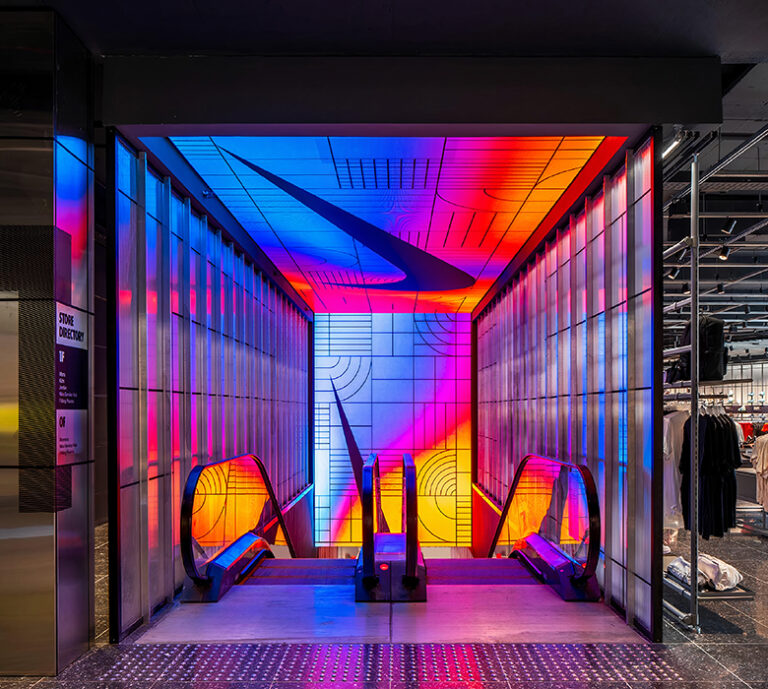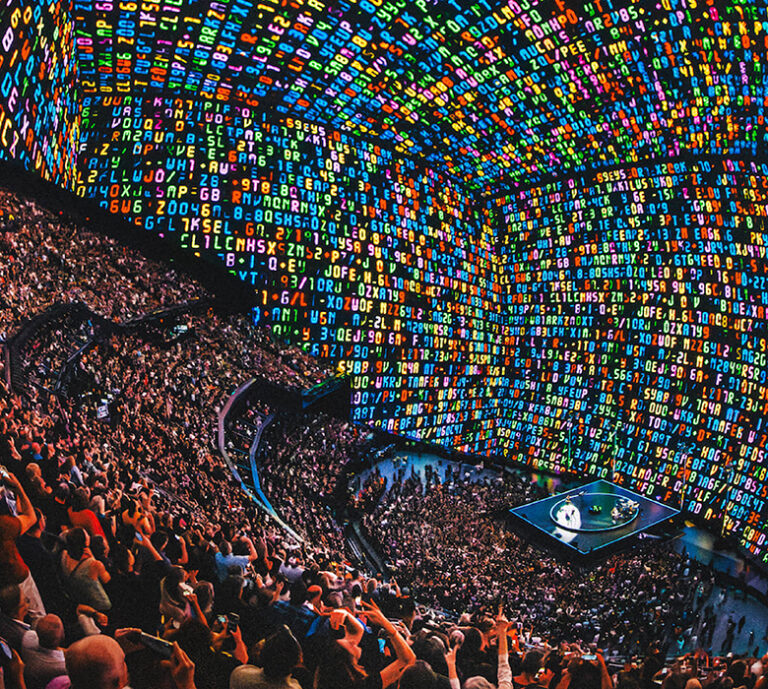×

Our Executive Director of Architecture, Glen Middleton, shares how brands should be approaching sustainable retail design.

In an interesting twist to our data-obsessed world, where humans arm themselves with an average of two devices at a time – from phones to PCs to smart watches to tablets – consumers are tired of being treated like numbers. This paradox couldn’t be illustrated more clearly when it comes to our relationship with technology – despite the fact that we live in a hyper-digital world, people still crave connection and belonging. We want technology to tell us how many steps we still need to take before we laze around the rest of the day, but we don’t want it when it makes us feel like less of a human. Oh, the irony!
Consumers want to be treated as individuals with their own unique tastes and priorities, and they expect personalized experiences that won’t make them feel interchangeable with everyone else. Not only that, but consumers are also counting on brands to help them be bolder and more authentic – they expect brands to show up like never before. Based on our years of working with some of the world’s largest retailers, it’s difficult to think of brands better-positioned to capitalize on these shifts than those in hospitality, specifically hotels. From the singular histories, cultures, and aesthetics of diverse locations around the world to the vastly different ways people travel, hotels have many ways to personalize brand experiences and delight guests.
However, far too many hotels have adopted a copy-and-paste approach to their experiences instead of building on the natural advantages of their properties and offering guests something truly unique. This is an ineffective approach for many reasons: it sacrifices an opportunity to build brand identity, discourages guests from returning, and increases the difficulty of attracting guests in the first place. The hospitality industry, often stuck in a loop of reactivity, struggles to keep pace with emerging trends like the demand for personalization and exceptional experiences. This status quo is under more pressure than ever.
Leaders recognize that they won’t be able to distinguish themselves without a proactive growth strategy and a holistic approach to brand differentiation. A focus on original and inclusive placemaking, a commitment to fostering a sense of belonging, and the ability to delight guests with thoughtful activations and compelling brand pillars will build a strong foundation for brand growth and equity.
There are three essential elements of a brand-led customer experience: trust, authenticity, and personalization. One of the reasons hospitality has historically been slow to offer the personalized experiences guests want is the desire to make those experiences consistent across locations. While consistency is vital for cultivating brand trust, too many hotels, especially large operations that have properties spanning the globe, think this means they have to play it safe with cookie-cutter design and experiences that are familiar (see: predictable) to guests. Hotels have many opportunities to build a lifestyle brand and make every interaction captivating and satisfying for guests.
But brands should be focused on quality – careful attention to detail, creative and welcoming placemaking, etc. – not interchangeable spaces and experiences that are more likely to bore guests than reassure or excite them. Major hotel chains can standardize the level of service they provide while localizing design, amenities, and services; deploying resources according to the specific demands of various target markets; and offering each guest a highly personalized experience. An effective brand strategy defines who you are as a business by leveraging your unique assets to create holistic and personalized experiences that customers won’t find anywhere else. For example, if environmental consciousness is part of your brand identity, towel reuse programs aren’t going to cut it. Guests deserve to know what you’re really doing to reduce your carbon footprint: did you use repurposed materials in design and construction? Are you giving back to the community in a sustainable way?
According to a 2022 Forrester survey, over three-quarters of decision-makers in the travel and hospitality industry “consider their personalization program to be business critical.” This is no surprise, as substantial majorities of consumers say personalized experiences make them significantly or much more likely to remain loyal. Despite the focus on personalization, less than 40 percent of consumers give companies in the travel and hospitality industry high marks on their efforts to personalize services and experiences. Closing this gap should be a top priority across the industry, for hotels of all sizes.
Much like the retail sector, under constant pressure from consumers to “level up” the experience, it’s important for hospitality brands to pose and answer these questions definitively: What makes your brand special? How can you build spaces and experiences around your singular brand ethos? How are you in an ideal position to delight your guests and keep them coming back?
Exceptional hotels are all about maximizing the value of physical spaces – from the cities where they’re located to the individual rooms and common areas (lobbies, gyms, bars, restaurants, and so on) that guests inhabit. A hotel’s brand, service, design, and location are all part of a cohesive whole. Your brand personality is intimately tied to the services you provide, how your spaces are designed, and all the ways that the hotel becomes an integral part of the local community. These are critical components of placemaking, which is what makes a space a magnetic force that will attract visitors and encourage them to stick around.
Beyond the basics, the not-so-obvious features of placemaking can make all the difference in forging a unique brand identity and providing remarkable, standout experiences. This was a topic discussed in depth during a panel we recently moderated at the HotelSpaces Conference about What Hoteliers Can Learn From the Experience Economy. Hyatt and MGM Resorts both shared the importance of how authenticity, art, culture, history, and even topography can all be integrated into your approach to placemaking. The alignment of these elements is what creates life-changing experiences that will capture guests’ imaginations, create an emotional connection, and build sustainable trust and loyalty.
There are many innovators in hospitality that have put placemaking at the center of their brand strategy. Ennismore has a wide array of distinctive hotels and resorts, restaurants, and venues; they are all designed to build community, promote and celebrate culture, and offer unique experiences. For example, their 21c Museum Hotels are usually in historical buildings with museums and galleries throughout the building. Another way industry leaders set themselves apart is through thematic branding. The handcrafted Graduate Hotels are built in university towns and designed around local cultures, particularly school histories and traditions. Graduate operates over 30 properties which feature refurbished interiors and a huge amount of college paraphernalia which has been donated or crafted for each hotel.
From global hotel networks to boutique experiences, the possibilities for placemaking are endless. Every city has its own atmosphere and culture, and localizing your brand helps to build a more emotional connection with your guests. Each of the hoteliers above saw an opportunity for growth and seized it – they recognized what overlooked cities (like Eugene, Oregon or Nashville, Tennessee) have to offer, and they helped to turn these cities into travel destinations. There weren’t many brands that recognized the value of building hip lifestyle hotels in these places, and the ones that did have become trailblazers – now everyone wants to build a lifestyle hotel in Nashville. Bold decisions like these can be a core part of your brand identity, but you have to be willing to think creatively and take your guests to unexpected places.
Hotels aren’t impersonal machines designed to churn customers in and out like they’re on a conveyor belt. Hospitality is a human-focused business, both in terms of the guest experience and the people who make those experiences possible. While consumers expect all companies to deliver personalized interactions, brands in the travel and hospitality industry are particularly responsible for making all guests feel welcome and valued as individuals. This means every facet of their experience should be focused around humanizing the brand experience.
For instance, when we at ChangeUp develop brand strategies, we use a blend of qualitative and quantitative consumer insights that give companies a clear picture of customer pain points and where value can be added. It wouldn’t be possible to personalize experiences without robust data on guests’ likes, dislikes, and interests; the synthesis of this data with an effective brand strategy is the most powerful way to maximize brand engagement.
These strategies will be particular to each company, but the guiding principles outlined above – personalize guest experiences, embrace your brand’s unique strengths and identity, and focus on placemaking – are essential across the industry. While each hotel should offer unique experiences, guests should always have full confidence in the quality of those experiences (which was a central focus when we worked with Holiday Inn and Holiday Inn Express, part of the IHG network with thousands of locations worldwide). But brand identities will always vary: for 1 Hotels, the identity is rooted in sustainability; for Proper, the focus is on community orientation and creative collaboration.
Although the development of a holistic brand should always be top of mind, it’s crucial to secure brand alignment on a human scale. This means embracing the diversity of your guests and locations while adhering to a core set of principles that guides your brand strategy. By humanizing your locations and experiences, you will forge more organic and long-lasting relationships with guests while dramatically increasing brand impact.


